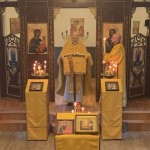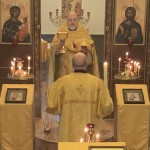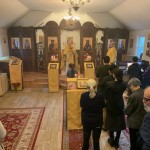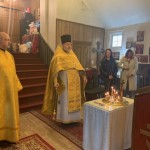On November 27, on the 24 th Sunday after Pentecost, as well as feast of the Holy Apostle Philip, our Parish family gathered for a beautiful celebration. The Divine Liturgy in our temple was served by our Rector, Archpriest Igor Tarasov. After the readings from the Sacred Scripture he addressed the faithful with the following homily:
“Dear brothers and sisters in Christ! Today in the Holy Gospel we heard a parable about a Good Samaritan in which Christ is telling us about salvation. Some lawyer which means a scholar of Jewish religion asked Jesus a very important question, “Teacher, what shall I do to inherit eternal life?” (Lk. 10, 25). Of course, this scholar tested the Savior, tried to argue with Him and to show Him his knowledgeable superiority. Today we commemorate Holy Apostle Philip, one of the 12 Apostles. He was also knowledgeable in Jewish law, but he followed Christ without questioning Him. And later, when St. Philip was preaching in Greece, the Jewish scholars of law were not lazy to go there to stop him and to have a dispute in order to show his knowledgeable inferiority, and then to condemn him in the eyes of the local Jews and the Greeks. But St. Philip was good enough in the law to denounce the Jewish scholars and prove that they were wrong”.
“Thus, the Jews were testing Jesus and they were testing His Disciples. But the question that a lawyer in today’s Gospel asked is really important: what should be done to be saved? At this question Christ is asking another, no less important question, “What is written in the law? What is your reading of it?” (Lk. 10, 26)”.
“Christ puts everything in a right order. He immediately shows who is who in this conversation; who is the Savior and who is the saved one. From now on the lawyer is not testing Jesus but Jesus is testing that Jewish scholar. We should notice that the scholar gave a right answer, he rightly indicated to what Jesus Himself called “the foundation of the law and the Prophets: “You shall love the Lord your God with all your heart, with all your soul, with all your strength, and with all your mind, and your neighbor as yourself” (Lk. 10, 27). However, giving a right answer the lawyer does not understand who is his neighbor. In the ancient Judaism the neighbor was considered your compatriot while a stranger was not viewed as a neighbor, thus according to the Law of Moses he could not be loved as oneself. With modern Christians it could be just the opposite: we are readily help to the needy somewhere in a remote country, but we do not notice the need of the people around us”.
“To answer that question, “who is my neighbor”, Jesus tells a parable about a Good Samaritan. This is the parable about Christ who came to save the dying humanity. A Jew who would listen to that parable could relate to the man who fell among thieves. And perhaps the Lord wished to create such an understanding of this parable. But a more profound sense of that story is that this unlucky man represents the whole human kind who had been robbed and bitten by the devil, so being half dead and covered with the wounds of sin, it cannot reach the holy city which is the Kingdom of Heaven”.
“And behold there appears a Samaritan, a man strange to the Jews. Samaritans were considered heretics and sectarians, they were the enemies of the Jews. But he helps that man on the road. That Samaritan is an image of Christ, the Savior of the humanity”.
“The parable also mentions a priest and a Levite who passed by (Lk. 10, 31-32). What can we say about them? Perhaps these people were not really bad, cruel or indifferent. They were heading to the Temple to fulfill the Law, and to touch a man who could be already dead, would defile them and would make them unfit to fulfill their obligations. Thus, on one hand, they were right in their actions, however the story gives them no justification. Christ made it very clear to His listeners that the Law does not save a man and that the Law can be fulfilled, but a man may die”.
“This is important for us to understand during the days of prescribed fasting. Tomorrow we begin the Nativity Fast, and the Church calls us to fast, but the fast by itself is not a goal. You can fulfill the law and fast, but at the same time you may not help the needy, may not fulfill the works of mercy”.
“Thus, this parable is very symbolic. Among the symbols is a Jew on the road who is the whole dying humanity; a Samaritan who is Christ the Savior; bandaging the wounds and pouring of oil and wine is spiritual healing; the inn and the innkeeper is the Church to whom Christ left His wealth, the grace of the Holy Spirit to care about human souls; finally a Samaritan’s promise to come back is our Lord’s second coming. But all these meanings were hidden from the first listeners of the parable. The only thing they did understand is that it is bad to be robbed and bitten while it is good to be rescued. And that initial understanding was enough”.
“Thus when the scholar of law understood what is good and what is bad, Christ gives him a command, “Go and do likewise” (Lk. 10, 37). Here the Lord reveals another mystery of salvation. He reveals what do you need to enter into eternal life. Thus in those words – “go and do likewise” – is the answer of Christ to the scholar’s question. Salvation is cooperation with God. It is not enough to be forgiven, not enough to be justified, not enough to be healed – you need to act in the same way, to become like Jesus, to become His Body. It is not enough to know what is good, you need to do it”.
“Dear brothers and sisters! Those who know about faith, about good and about morals are many among us, but those who labor are few. The dreamers are many, but the actors are few. The called are many, but those who respond to the calling are few. Therefore, let us fulfill the Savior’s command, let us go and do likewise. Then we would become worthy to enter into eternal life!”
During the Litany of Fervent Supplication the Rector had a petition for the suffering country of Ukraine and its people. He also added a commemoration of the “suffering Ukrainian land” at the Great Entrance.
During preparation for Holy Communion the choir prayerfully performed hymns dedicated to Holy Apostle Philip.
After the dismissal of the Liturgy the Rector served the memorial Litia for the victims of the great famine in in 1932-1933, commonly known as Ukrainian Holodomor. It has been 90 years after the beginning of that genocidal act of the Communist regime. The Rector preached a short sermon in Russian pointing out that there were many such genocides in the history of mankind. Presently, after 90 years another genocide is taking place in Ukraine. Evil does exist in the world and there are many evil people out there. But, we, as Christians are called to do good and to multiple love and care in the world. Seeing the example of Good Samaritan from today’s Gospel parable, we have to exercise love, mercy and compassion. If we will, the world will become better.
Fr. Igor also made an announcement regarding the Nativity Fast and invited everybody to our parish Thanksgiving luncheon. Thus, after finishing all the services, the Rector and parishioners enjoyed sumptuous and delicious meals, including the Thanksgiving turkey.






